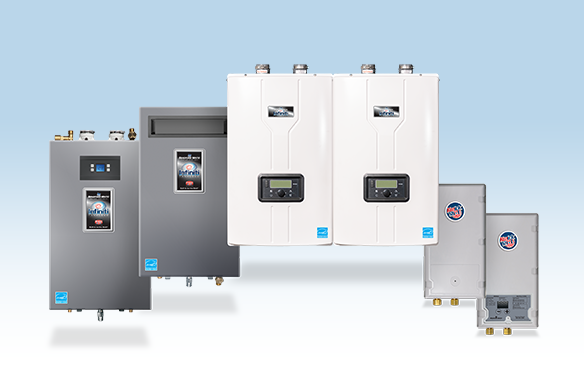We have uncovered this article relating to Why You Should Consider a Tankless Water Heater listed below on the net and decided it made good sense to discuss it with you in this article.

In a globe where benefit and effectiveness reign supreme, it's no surprise that home owners are frequently in search of smarter ways to manage their home's energy consumption and comfort. One innovation that has progressively gotten popularity is the tankless hot water heater. But what exactly makes these systems stick out from the conventional tank-based designs the majority of us matured with? Allow's dive in and discover the advantages of tankless hot water heater, aiding you determine if it's time to make the button in your home.
Introduction
Picture this: you enter the shower after a lengthy day, anticipating a soothing waterfall of hot water, just to be greeted by icy beads due to the fact that the last person used it all up. Sound familiar? Conventional water heaters store a set quantity of warm water, implying you're at the grace of that container's supply. Tankless systems, on the other hand, warm water on demand. Say goodbye to running out mid-shower, no more fumbling with routines simply to guarantee hot water is available.
Comprehending Tankless Water Heaters
What Are Tankless Hot Water Heater?
Tankless hot water heater, often called on-demand or instant water heaters, offer hot water just as it's needed. As opposed to storing gallons of pre-heated water, these devices kick right into action the moment you turn on the tap. Water travels through a heat exchanger, heating up in real-time, implying you obtain a nonstop flow of hot water without the demand for a large container resting idly by.
How Do They Differ from Conventional Systems?
Typical heaters hold a tank of warm water, making use of power to maintain that storage tank at a consistent temperature level. Tankless systems remove the standing supply, lowering wasted power and the bulky impact of a huge cyndrical tube. Basically, you're upgrading from a "stockpile" frame of mind to a "made-to-order" strategy.
Usual Kinds Of Tankless Devices
Tankless water heaters normally are available in two ranges: gas and electric. Gas versions tend to provide greater flow rates, perfect for larger households, while electrical designs often offer smaller sized homes and are commonly much easier to install. In addition, some systems are developed for point-of-use (offering one component) while others can take care of the whole home's hot water demands.
Trick Advantages of Tankless Water Heaters
Power Effectiveness and Cost Financial Savings
Say goodbye to heating up a titan storage tank's worth of water and keeping it toasty all the time. Tankless heaters reduce standby power losses, which can lower energy costs. While the first expense might be greater, the lasting cost savings typically warrant the investment.
3. Space-Saving Layout
If your home is short on storage space, getting rid of the bulky storage tank frees up important area. Tankless devices are small and can often be mounted on walls, stashed in edges, or installed in tight utility wardrobes without grabbing all of the whole space.
4. Longer Life expectancy
A well-kept tankless hot water heater can outlast its tank-based cousin. Traditional containers may last 10-15 years, while tankless models can maintain downing along for two decades or even more, making them a solid financial investment gradually.
1. Limitless Hot Water Supply
Ever before had to arrange showers so everybody gets their reasonable share of warm water? With tankless, that comes to be a distant memory. As long as the heating system's flow ability isn't exceeded, you can take back-to-back showers without developing into a popsicle.
5. Improved Water High Quality
Saving water in a storage tank can in some cases bring about sediment accumulation or a somewhat "off" taste. With tankless systems, fresh water is heated up instantly, reducing the possibilities of sediment buildup and potentially offering cleaner-tasting water.
Considerations Before Changing
Though the advantages are compelling, it's important to take into consideration a couple of elements before completely dedicating.
Evaluating Your Home's Water Use Patterns
If your house simultaneously makes use of numerous fixtures with high hot water need, see to it the device's circulation price satisfies your requirements. Knowing your usage patterns aids you choose the best size and sort of tankless heating system.
Maintenance and Treatment Tips
Tankless systems are fairly low maintenance, but they aren't set-it-and-forget-it home appliances.
Routine Cleaning and Descaling
Hard water minerals can develop in the warmth exchanger, influencing efficiency. Routine descaling (usually suggested yearly) maintains the device going for peak performance.
Annual Specialist Evaluations
A yearly checkup from a professional makes sure small problems are caught early. They'll assess the system's performance, seek leaks, and help preserve optimal efficiency.
Initial Financial Investment Prices
Tankless heaters generally come with a higher ahead of time price tag. Between the system itself and potential setup modifications, the first price could give you sticker shock. Yet keep in mind to watch it as a long-term investment.
Installment Requirements
Relying on your home's framework, you could need added electric capacity or gas line upgrades. Guarantee you comprehend the installment needs and seek advice from a specialist to stay clear of shocks.
Making Certain Proper Air Flow
For gas versions, proper air flow is important to securely get rid of exhaust gases. Ensure venting systems are clean and properly mounted to avoid any possible security threats.
Comparing Different Brands and Models
Not all tankless hot water heater are created equivalent.
Looking Into Dependable Makers
Search for reliable brands with a history of producing quality units. A reputable producer typically offers far better client assistance and longer warranties.
Installation: Do It Yourself or Professional?
While some homeowners relish tackling tasks themselves, tankless setup may not be the best time to break out the tool kit.
Advantages and disadvantages of Do It Yourself Installation
A do it yourself mount might save cash, yet it features threats. Inaccurate installation can bring about ineffectiveness or safety concerns. If you're handy and have experience, it may be viable-- however proceed with care.
Checking Out Evaluations and User Feedback
Customer reviews and responses from next-door neighbors or good friends that have actually gone tankless can provide beneficial understandings. Often, real-life experiences can be more telling than advertising and marketing sales brochures.
When to Call a Specialist Plumbing Professional
For the majority of, calling a pro makes sure everything's done correctly. An expert plumbing professional comprehends regional codes, sizing requirements, and venting specifications, reducing the danger of mishaps.
Optimizing Efficiency
You have actually purchased a tankless unit-- now maximize its performance.
Optimal Temperature Settings
Many people set their units between 120-140 F. Adjusting the temperature can improve convenience and savings. Experiment to find a pleasant area that doesn't squander power.
Pairing with Low-Flow Fixtures
Intend to stretch your system's capabilities? Think about setting up low-flow showerheads and taps. They minimize water usage, allowing your tankless system to deliver a steady stream of hot water without stressing.
Environmental Influence
Tankless hot water heater line up with greener living goals.
Decreased Carbon Impact
By utilizing less power and only home heating water as required, tankless systems can lower your home's carbon impact, reducing your ecological effect.
Preserving Natural Resources
Much less power intake and less thrown away warm water translate right into fewer natural deposits being utilized, an environmental win-win.
Who Profits Most from Tankless Heating systems?
The beauty of tankless heaters is that they can fit a range of homes.
Huge Households vs. Single Owners
Large families might enjoy the countless warm water supply, while single occupants value the energy financial savings from not heating a whole storage tank for just someone's morning shower.
Homeowners with Restricted Area
If your home is short on square video footage, shedding the bulky tank frees up area for various other basics-- or perhaps simply much more elbow room.
Eco-Conscious Customers
Going tankless aligns with eco-friendly values, guaranteeing you're not losing energy or sources.
Future Patterns in Tankless Hot Water Heater
The globe of home appliances is ever-evolving, and tankless hot water heater are no exemption.
Improvements in Innovation
R&D is frequently enhancing warm exchangers, making devices a lot more efficient and resilient. Future versions could be even quieter, a lot more small, and far better matched for differing environments.
Smart Home Combination
Visualize adjusting your water heater's temperature through an application or receiving maintenance alerts on your phone. As smart home technology advancements, we'll see more connectivity and comfort.
Final thought
Picking a tankless hot water heater is more than simply upgrading your home's warm water system; it's investing in lasting comfort, power performance, and a greener way of life. By considering your household's water usage, bearing in mind installment requirements, and dedicating to normal maintenance, you can take pleasure in a steady stream of hot water without the baggage of a large tank. As innovation evolves, you can look forward to also smarter, a lot more reliable tankless options that not only make your life less complicated however likewise profit the world.
Why You Should Consider a Tankless Water Heater for Your Home
Energy Efficiency and Cost Savings
Tankless water heaters, also known as on-demand water heaters, heat water only when needed. This means they don't waste energy keeping a tank of water hot constantly. This efficiency translates into substantial cost savings on your monthly energy bills.
Endless Hot Water Supply
One of the significant advantages of tankless water heaters is their ability to provide a continuous supply of hot water. Traditional tank water heaters have a limited capacity and can run out of hot water, especially during peak usage times. In contrast, tankless water heaters can provide an endless stream of hot water, making them ideal for larger families or homes with high water usage.
Space-Saving Design
Tankless water heaters are compact and take up significantly less space compared to traditional tank heaters. They can be installed on walls, under cabinets, or even outside, freeing up valuable space in your home. This makes tankless water heaters a great option for smaller homes or properties with limited space for a traditional water heater.
Longer Lifespan and Lower Maintenance
Tankless water heaters typically have a longer lifespan compared to traditional tank heaters. They can last up to 20 years or more with proper maintenance. Additionally, tankless systems are designed with replaceable parts, which can extend their lifespan further and reduce long-term maintenance costs.
Environmentally Friendly
Reducing energy consumption not only saves you money but also benefits the environment. Tankless water heaters contribute to a smaller carbon footprint by using less energy to heat water. Their energy efficiency and ability to minimize standby heat loss make them an eco-friendly choice for environmentally conscious homeowners.
Customized Temperature Control
Tankless water heaters offer precise temperature control, allowing you to set the desired temperature to meet your specific needs. This level of customization ensures you always have water at the perfect temperature for your comfort and usage requirements.
https://beantownservices.com/blog/consider-tankless-water-heater-for-your-home

I stumbled upon that piece on Why You Should Consider a Tankless Water Heater when looking around the search engines. Do you know anybody else who is in the market for ? Why not share it. We thank you for your readership.
Estimate
Comments on “How Tankless Water Heaters Elevate Household Benefits”